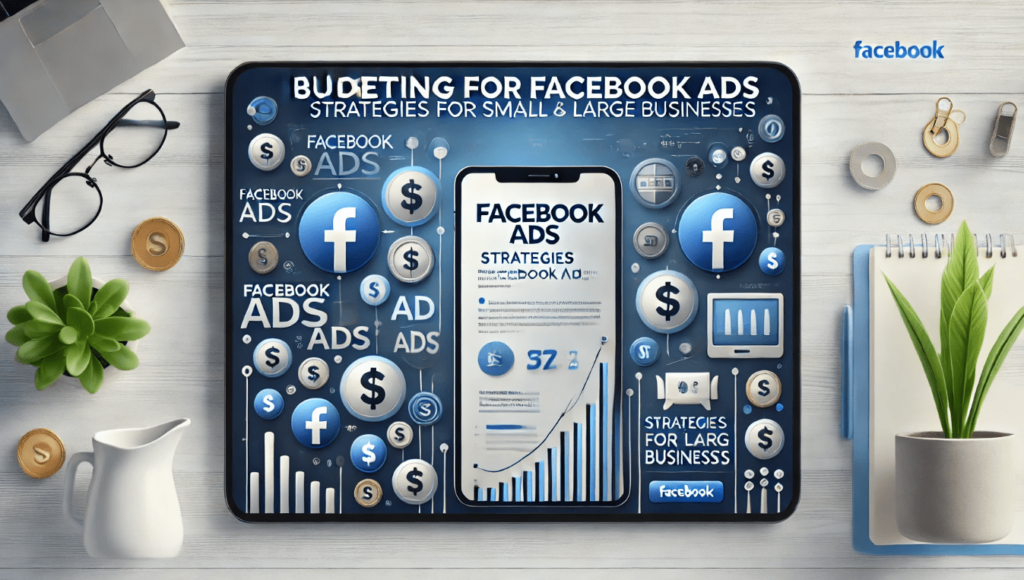In the rapidly evolving world of digital marketing, Facebook ads have become a cornerstone strategy for businesses of all sizes. The platform offers unparalleled reach and targeting capabilities, making it an essential tool for both small and large businesses. However, one of the biggest challenges is figuring out how to budget effectively for Facebook ads. This article will provide strategies for budgeting for Facebook ads that are tailored to the needs of both small and large businesses.
Understanding the Basics
Before diving into budgeting strategies, it’s crucial to understand the basics of Facebook ads. Facebook offers various ad formats, including image ads, video ads, carousel ads, and more. Each ad format serves different purposes and targets different audience segments. Additionally, Facebook provides robust targeting options, allowing businesses to reach specific demographics, interests, and behaviors.
Setting Clear Objectives
The first step in budgeting for Facebook ads is setting clear objectives. What do you want to achieve with your ads? Objectives can range from brand awareness and website traffic to lead generation and sales. Your objectives will influence your budget, as different goals require different levels of investment. For instance, driving website traffic might require less budget than a comprehensive lead generation campaign.
Small Business Budgeting Strategies
Small businesses often operate with limited marketing budgets, making it essential to maximize every dollar spent on Facebook ads. Here are some strategies tailored for small businesses:
1. Start Small and Scale
For small businesses new to Facebook ads, it’s wise to start with a small budget. This approach allows you to test different ad formats, audiences, and creatives without risking a significant portion of your marketing budget. Once you identify what works best for your business, you can gradually increase your budget.
2. Focus on Local Targeting
If your small business serves a local community, leverage Facebook’s geo-targeting capabilities. By targeting ads to a specific geographic area, you can ensure that your budget is spent on reaching potential customers who are more likely to convert.
3. Utilize Facebook’s Budget Optimization Tools
Facebook offers several budget optimization tools, such as automatic placements and campaign budget optimization (CBO). These tools can help small businesses maximize their ad spend by automatically allocating the budget to the best-performing ads and placements.
4. Track and Adjust
Continuous monitoring and adjustment are key to effective budgeting. Use Facebook’s analytics tools to track the performance of your ads. If an ad isn’t performing well, don’t hesitate to adjust your targeting, creative, or budget allocation.
Large Business Budgeting Strategies
Large businesses often have more substantial marketing budgets, but they also face greater complexity in their campaigns. Here are strategies for large businesses to effectively budget for Facebook ads:
1. Allocate Budget Across Multiple Campaigns
Large businesses typically run multiple campaigns simultaneously, targeting different segments and objectives. It’s essential to allocate the budget across these campaigns based on their priority and expected return on investment (ROI). For instance, brand awareness campaigns might receive a smaller budget compared to conversion-focused campaigns.
2. Invest in High-Quality Creative
High-quality creative content is crucial for the success of Facebook ads. Large businesses should invest in professional ad creatives, including images, videos, and copy. High-quality creatives can significantly improve ad performance and ROI.
3. Leverage Advanced Targeting Options
Large businesses have access to extensive customer data, which can be used to create highly targeted ads. Utilize Facebook’s advanced targeting options, such as custom audiences and lookalike audiences, to reach specific customer segments. This approach can lead to higher conversion rates and better ROI.
4. Use A/B Testing
A/B testing is a powerful tool for optimizing ad performance. Large businesses should regularly conduct A/B tests on different ad elements, such as headlines, images, and calls-to-action. The insights gained from A/B testing can help refine future campaigns and improve budgeting efficiency.
Balancing Budget and Performance
Whether you’re a small or large business, finding the right balance between budget and performance is crucial. Here are some general tips for achieving this balance:
1. Set Realistic Goals
Setting realistic goals is essential for effective budgeting. Unrealistic expectations can lead to overspending without achieving the desired results. Analyze past campaign data and industry benchmarks to set achievable goals.
2. Monitor Key Metrics
Keep a close eye on key performance metrics, such as cost per click (CPC), cost per acquisition (CPA), and return on ad spend (ROAS). Monitoring these metrics can help you identify underperforming ads and reallocate your budget more effectively.
3. Adjust Based on Performance
Flexibility is key to successful budgeting. Be prepared to adjust your budget based on ad performance. If a particular campaign is exceeding expectations, consider increasing its budget. Conversely, if a campaign is underperforming, reduce its budget or pause it altogether.
4. Plan for Seasonality
Many businesses experience seasonal fluctuations in demand. Plan your ad budget accordingly to take advantage of peak seasons. For example, e-commerce businesses might allocate a larger budget during the holiday season when consumer spending is higher.
Conclusion
Budgeting for Facebook ads requires a strategic approach, tailored to the unique needs of your business. Small businesses should focus on starting small, utilizing local targeting, and leveraging Facebook’s optimization tools. Large businesses should allocate budgets across multiple campaigns, invest in high-quality creative, and utilize advanced targeting options. Regardless of business size, setting clear objectives, monitoring performance, and being flexible with budget adjustments are key to maximizing the effectiveness of Facebook ad campaigns.
By implementing these strategies, businesses can ensure that their Facebook ad budgets are spent wisely, driving meaningful results and contributing to overall business growth.

